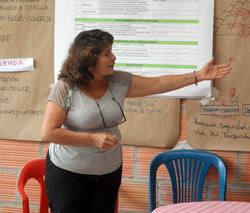
—Luz Esmeralda García
Luz Esmeralda García, a 53-year-old mother of two, lived a stable life in Tame, where she and her partner raised livestock on a farm, owned a small business, and had a lovely home. Life on their land was quiet until the war came. “When the guerrillas came, they told us to arm ourselves and join their ranks, or leave,” she recalls. After this threat, they moved to Villavicencio, where other struggling displaced families had gone. In discussion with other displaced women in her community, Luz discovered that few knew about their rights or options. She became the leader of the Network of Displaced Women in Meta and realized that to move forward with their lives, the women in her community—many of them widows—needed land.
Luz heard about an INCODER program that distributed land to displaced families, but the application process was technical, competitive, and overwhelming. She hired a previous winner to help her write her application, and won.
INCODER provided the land, but no technical assistance or other agricultural support. The women arrived on the land, divided it into 21 plots, formed a women’s agricultural association called Agroempo, and settled there with nothing but a dream for their future. Knowing they needed more support, Luz contacted local authorities, who connected her with USAID’s Land and Rural Development Program (LRDP), which supports rural families with packages of interventions that improve land access, connect families with agricultural projects, and increase rural development.
LRDP worked with the women and municipality to ensure the women could access and benefit from PARES funding—a mechanism that brings national-level funds into rural areas. By mobilizing resources this way, LRDP helped the women’s association access seeds, fertilizer, and other agricultural inputs. LRDP also gave them technical assistance to help them use their land in the best way possible. Further, the program connected the women’s association with local authorities to ensure they had a voice in the creation of rural development plans, and helped the municipality undertake a road study. When the road is built in the future, the women will have greater access and connectivity to buyers and markets.

